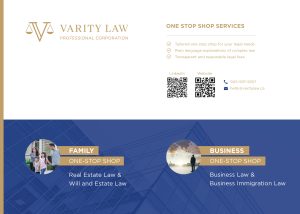With Christmas fast approaching, many of our clients are thinking about family and friends. COVID-19 have brought many uncertainties to life, and many people are now making estate planning one of their top concerns. We have received countless questions regarding how to properly choose estate trustees and beneficiaries. While each person’s situation and goals are different, there are several top considerations for every estate plan.

-
Choosing one or more estate trustees
Estate Trustee is the person who actually distributes the estate. After a person passes, many registered assets, such as real estate, must be first transferred to the estate trustee, and then he/she will transfer it to the beneficiaries according to a Will or if no Will, then according to Succession Law Reform Act. As well, the testator’s liquid assets are placed into an Estate Account at the bank, and the Estate Trustee(s) will be the only signing officer who can authorize withdrawals from it.
Although the Estate Trustee(s) is required to obey the Will and relevant legislations, there is usually not a governing body who oversee their actions. This means that if they are acting improperly, the usual solution is for the beneficiaries to sue them.
Evidently, it’s important to choose a trustworthy person who would have no conflict of interest with the beneficiaries. The Estate Trustee(s) and the beneficiary may be the same person, and that is usually a good way to avoid any conflicts. As well, it is more tax efficient for the beneficiary to take their share of the estate (which is not taxed as their taxable income) compared to the estate trustee taking service fees for distributing the estate (which is added to their taxable income).
The Estate Trustee may be anyone selected by the testator. If there are no one trustworthy, the testator may also choose a professional such as a lawyer, accountant, or financial institution personnel as the estate trustee, although such third parties will usually charge relatively high service fees (e.g. 3-5% of the estate).
It is better for the Estate Trustee to reside in the same place as the estate, as frequent trips to banks, law offices, and accounting firms may be required. Usually, the Court is unwilling to authorize a person who does not reside in the same place as the estate to become the Estate Trustee if there is no Will. However, if there is a Will, most often the Court will agree with the testator’s written wishes, regardless of whether the chosen Estate Trustee resides in the same place as the estate.

-
Beneficiaries
If there is a will, then the beneficiaries may be anyone, whether or not they have a marital or blood relations with the testator.
However, if there is no will, then according to Succession Law Reform Act, the estate MUST be distributed this way (unless any beneficiaries voluntarily give up their right to the estate):
- If the testator has a spouse, then the spouse first gets a fixed amount of money called preferential share – since March 1st, 2021, the preferential share is $350,000
- Then, if the testator only has 1 child, the spouse and the child equally distributes the rest of the estate; if there is more than 1 child, the spouse gets 1/3, and the rest 2/3 is equally distributed amongst the children;
- If there is no spouse and no children, the estate goes to the testator’s parents;
- If there are no parents, the estate goes to the testator’s brothers and sisters, or their offspring(s);
- If there are none of the above, then it reverts back to the Crown.
If there are more than one beneficiary, then the Court would need to see that all beneficiaries are notified of the testator’s passing and either claims or gives up their share of the estate. Without their written consent, the estate distribution is usually halted. This may create a lot of troubles for people who have beneficiaries (especially those according to Succession Law Reform Act) who live outside of Canada.

-
Underage Beneficiaries
There are many types of assets that cannot be owned by underage beneficiaries until they reach 18 years old, such as real estate properties.
If estate is given to underage beneficiaries, then they must have a guardian of property who hold the assets for them until they become 18. The guardianship application is quite complex, as the Courts want to see a comprehensive financial plan about how the asset would be managed until they are 18. Alternatively, their share can also be held by the Court, to be released when they are 18 – in the interim, if their custodian need to use their estate for legitimate spending like school or medical expenses, then they must make an application to the Court for each expenditure. Evidently, this whole process is very troublesome.
Alternatively, the testator can choose a trustworthy person and make a direct distribution to that person instead, such as the minor beneficiary’s parents. Of course, then it becomes a balance of trust vs. convenience.
An important thing to keep in mind: if there is no will, then the estate will distribute according to the Succession Law Reform Act. So in the absence of a will, even if the testator wanted to avoid the whole guardianship fiasco but do have minor children, then they cannot avoid it after all.

Conclusion
Christmas is almost here – a great gift for family and friends is a good estate plan, which gives them the rewards of your hard work and will make their most difficult times easier. I personally just finished my own Will with my husband as our firstborn son reaches 1-year-old this year.
For all our clients and readers, a friendly reminder that Varity Law Prof. Corp. will be closed for the holidays from December 20th , 2021 to January 3rd, 2022. We would be pausing our busy work lives for a bit, and spend some quality time with family and friends.
We sincerely thank all our clients and readers who supported us for another year. We are so proud to have helped so many families and businesses, and we will continue to protect family assets and facilitate corporate success to the best of our abilities. Wishing everyone a heartwarming Christmas and a prosperous New Year , we will see you all in 2022!






